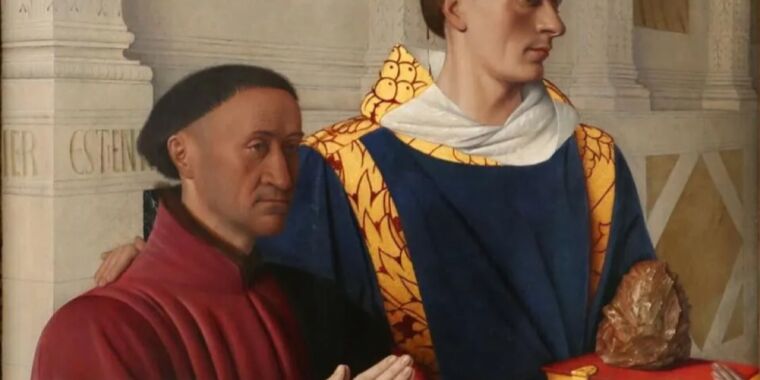- cross-posted to:
- history
- [email protected]
- cross-posted to:
- history
- [email protected]
I want to see the images imposed on each other as suggested would occur if the hinge was in place
Damn. That is one firm boob.
If I dust off the old Art History learnings, the Madonna would have been painted in a way that appeared other-worldly so as to separate her from what any mere mortal would identify as human. Said differently, Mary’s boobs have to be painted in a way that don’t look like human boobs so humans 1) don’t get lusty in church and 2) retain their awe of the story and its characters and thus maintain the Christian power structure.
I mean, if you’re breastfeeding they do get like that sometimes, but the placement of the boobs so far apart is what weirds me out
Somebody has a bad case of capsular contraction and needs to sue her plastic surgeon for malpractice.
There’s room for a third one in there.
This is the best summary I could come up with:
Around 1455, a medieval French painter and miniaturist named Jean Fouquet painted a small diptych with two panels, one of which depicts St. Stephen holding a strangely shaped stone—usually interpreted as a symbol of the saint’s martyrdom by stoning.
The left panel depicts Etienne Chevalier, who served as treasurer to King Charles VII, clad in a crimson robe while kneeling in prayer.
Just last year, Monja Schünemann of Chemnitz University of Technology suggested that Fouquet painted the two panels so that folding them reveals a hidden image.
Past technological studies revealed that Fouquet had corrected the heads of both Chevalier and St. Stephen in such a way as to ensure that certain points in the painted image would meet up in a specific way when the hinged diptych was closed.
Co-author Steven Kangas, an art historian at Dartmouth, had long been fascinated by the jagged stone in the left panel because it looked like a prehistoric tool.
Rather, numerous recorded oral histories describe such objects as “thunderstones,” since it was believed they “shot from the clouds” whenever lightning struck the ground—although at least one 16th-century German scholar, Georgius Agricola, dismissed that popular belief.
The original article contains 585 words, the summary contains 193 words. Saved 67%. I’m a bot and I’m open source!
Saved 67% (the content)
Kept 33% (the filler)
It is kind of a miss, yeah. Missing both the prehistoric axe and what happens when the pictures are superimposed. They reveal it in the article, but check the linked paper in the article for the illustration.





